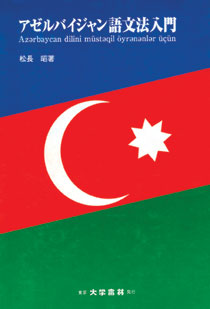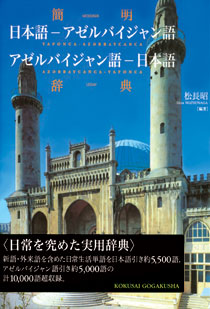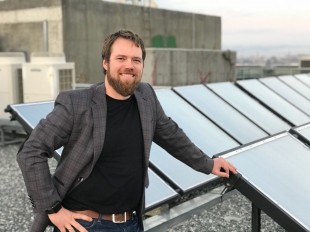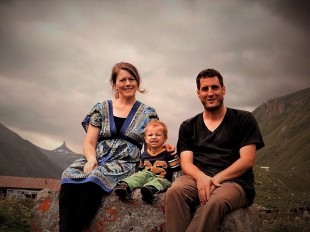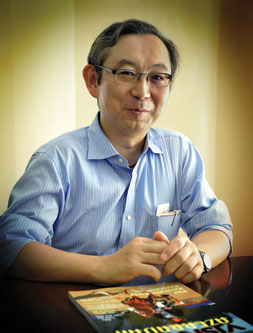 Dr Akira Matsunaga has been a frequent visitor to Azerbaijan since the 1990s. He made his first trip to Baku from Ankara, where he was a diplomat at the Japanese Embassy. It wasn’t too difficult for Dr Matsunaga to communicate with people in Azerbaijan, as he is a fluent Turkish speaker. That knowledge was essential to one of his latest projects, the compilation of an Azerbaijani-Japanese dictionary. Dr Matsunaga is now a professor at Tokyo University, where he lectures on the Caucasus region, and a researcher for Japan’s Sasakawa Peace Foundation. Our meeting in Baku began with language, so it’s no wonder that we talked half in Turkish and half in Azerbaijani.
Dr Akira Matsunaga has been a frequent visitor to Azerbaijan since the 1990s. He made his first trip to Baku from Ankara, where he was a diplomat at the Japanese Embassy. It wasn’t too difficult for Dr Matsunaga to communicate with people in Azerbaijan, as he is a fluent Turkish speaker. That knowledge was essential to one of his latest projects, the compilation of an Azerbaijani-Japanese dictionary. Dr Matsunaga is now a professor at Tokyo University, where he lectures on the Caucasus region, and a researcher for Japan’s Sasakawa Peace Foundation. Our meeting in Baku began with language, so it’s no wonder that we talked half in Turkish and half in Azerbaijani. You are the author of a number of books about Azerbaijan. Was it difficult for you to compile the Azerbaijani-Japanese dictionary? How are our languages similar?
They are completely different! But I like Azerbaijani very much, it’s such a sweet language. It wasn’t too difficult because I already knew Turkish which is very similar to Azerbaijani, though I’m continuing to find out more about your language.
You lived for quite a long time outside your own country and have met different people from different cultures. Do you think there is a big difference between our nations – Azerbaijani Turks and Japanese?
I would say that our two nations have much in common. And hospitality is a key to issue. Azerbaijanis and Japanese take it very seriously. We also like guests and do our best make them feel at home.
What are your impressions when you visit Azerbaijan?
Unforgettable, different and better every time. I have been coming to Baku since 1992. And if we compare those times with nowadays then it is like chalk and cheese – so many changes have been made since my first visit. I come to Baku very often so I don’t even remember how many times I have visited your city.
Where do you think Azerbaijan has potential but could do better?
Industry. Besides that, Azerbaijan has huge potential in the tourism sector.
Japan is attractive but at the same time very remote for many tourists. What experience can Japan share with Azerbaijan in the tourism sphere?
I think that good promotion worldwide is important for countries that want to develop tourism. Yes, Japan is quite remote. Let’s talk about Turkey which is close to you and is one of the most popular destinations for international tourists, not only from Europe but from America and Asia as well. I think that good advertising plays a huge role in that. Even in Japan, TV commercials about Turkey are shown regularly. People are interested and visit the country. And what’s more interesting is that once they’ve been to Turkey those Japanese tourists want to go there again and again. Still, there is no TV commercial about Azerbaijan in Japanese. I’m sure that if there were, Japanese tourists would come to Azerbaijan as well. This is another country that you want to return to again and again.
But is it enough just to have good promotion?
Indeed it’s not. It’s no less important that what’s on offer here meets what has been advertised. Good conditions, nice service, tasty food and convenient infrastructure are reasons for foreigners to return. I think Azerbaijan has good potential, especially now that it’s improving its infrastructure. Baku is such an attractive city and there are other towns and cities well worth a visit –Sheki, Lenkeran, Nakhchivan. Unfortunately, the Japanese still have no idea where Azerbaijan is.
What’s your main interest in Baku? What further projects would you like to carry out here?
My big interest is connected with the old part of Baku, known as Icheri Sheher. I’m very keen on the history of the city, how it was built, what kind of memories are left and so on. As well, I’m very interested in stories about prominent old Bakuvians. For example, Zeynalabdin Taghiyev, who was a well-known philanthropist in Azerbaijan. He supported the construction of dozens of great buildings with their own original style. You know, every city should have something that makes it special and different from others. I think those historical buildings constructed during the ‘golden oil era’ by philanthropists like Zeynalabdin Taghiyev are what make Baku so special. The skyscrapers that are being built in Baku now are like those in Dubai and elsewhere and are less attractive than the heritage left by the old Bakuvians. This history is what makes Baku distinctive from other cities. And this is something that brings in tourists.
As you said, new skyscrapers are being built at almost every step in Baku. On the one hand, the city is gaining a new modern dynamic, but on the other it is somehow losing its old style. What is the situation in Japan? Is there any state policy on the appearance of buildings?
There are too many skyscrapers in Japan as well, but this is a recent development. In Azerbaijan you have used stone for construction for centuries whereas in Japan we used wood, which meant that that after some time we had to reconstruct buildings using other materials. For example, during World War II Tokyo was completely destroyed during bombing; it had to be rebuilt. We can say that from 1945 we started to build Tokyo from scratch.
Japan suffered a terrible year in 2011 when the earthquake and tsunami triggered the Fukushima nuclear disaster. What would be your message to the international community, and particularly to the Azerbaijani people, after these tragedies?
Natural disasters are unpredictable. What we as human beings can do is withstand them by creating new technologies. Japan has very good experience of anti-earthquake systems used in construction. Baku is also located in a seismic zone. We would recommend that Azerbaijan use this technology; we could share our experience.
Which countries use Japanese anti-earthquake technology? It’s a very expensive system, isn’t it?
Besides Japan, this technology is in wide use in the USA. Yes, it’s quite expensive but at the same time it prevents greater losses. It is better to spend once than lose twice as much. It’s very safe. For countries like Iran, Turkey and Azerbaijan there is an earthquake risk.
In your work you mainly study the geopolitical situation of the South Caucasus region. What do you think are the geopolitical challenges facing Azerbaijan? How do you see the role of Azerbaijan in the years to come?
Geographically and geopolitically Azerbaijan has a very good position in the South Caucasus region. The oil factor plays a huge role nowadays, so Azerbaijan is lucky. This is like a window onto the wider world. The country has huge economic potential. But I think Azerbaijan can and will work harder to boost its economic development. One of the problems is to provide more jobs for young people.
Do you see any changes in Azerbaijan’s relations with its neighbours?
I think whatever the interests of Azerbaijan’s neighbours towards it, the country should follow a balanced policy. Baku should support fraternal, strategic relations with Turkey no matter what. Also it has improved cooperation with Russia, which is the biggest and strongest country in the region, and I think Azerbaijan should continue this policy. The country has all the prerequisites to become a prosperous nation.
